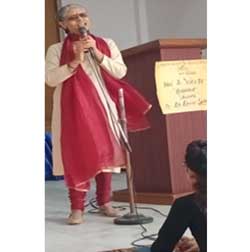Dr. Rashmi Sethi
Designation: Renowned Educationist & Teacher Educator
"How to Write Reflective Journal?"
A reflective journal is a personal record of student's learning experiences and actions performed by an individual. It is a space where a learner can record and reflect upon his/her observations and responses to situations faced. These can then be used and revived to explore and analyse ways of thinking and perform in certain tasks. Journals, although generally written, can also contain images, drawings and other types of reference materials which enhance the importance of reflective journal and make it useful for a student to turn back and improve upon the errors and make sure not to repeat them in future to learn in a better way.
GIAST organized a workshop on "How to write Reflective Journal" The resource person to enlighten the student teachers for the topic was Dr Rashmi Sethi, a renowned educationist and teacher educator. She also has served as an education officer, thereby contributing maximally in the field of education. She was awarded for 'All round best M.Ed. student'. She also got scholarship for 5 years. Manipur Government invited her to train in-service teachers and also conducted innovative workshops for teachers, mothers & students. Workshop commenced at 10:00 a.m. as per the schedule and then there was no stopping of the wave of knowledge which Dr Rashmi began with. She began with the meaning of Reflective journal and how it is important for all of us to reflect on our actions in life.
Dr. Rashmi started workshop by saying that 'Teaching is a beautiful job' and mentioned that reflection is everywhere, each and every person thinks about everything he/she see or does whether thinking is positive or negative, but reflection helps us to think positively. She said that writing of reflective journal make us holistically developed and also helps how we can know more about ourselves so that we can clearly make right decisions for our lives.
She also discussed that how a teacher can maintain classroom environment, how back-benchers can also be active and become part of class. She took an example as when students yawn during lecture, it is not a bad thing, she explained it very positively by saying that student yawns during lecture because ears are not enough to grasp knowledge that's why students yawn to grasp more knowledge which was indeed a positive perception which can help a teacher to create a conducive environment in the class and motivates children to confide in teacher positively. Dr Rashmi also declared that a student who ask questions, learn more than who don't ask. She also gave live examples.
Dr Rashmi discussed about the capabilities of a teacher and emphasised upon the fact that a teacher is a nation builder as she/he deals with number of students at once in a class who further extend the learning to the masses ahead. So, a teacher in the class shall set an ideal example for the students. She mentioned that a well-written journal can be an important tool. As with any tool, to get the most benefits, you need practice. This could mean forcing yourself to write, at first, but after a while, it will become like second nature. Write down your entry as soon as possible after the event. This way, the details will still be fresh in your mind, which will help later in your analysis leading to better results and learning from oneself.
Workshop ended on the note that one must line up the experiences by writing it as reflective journal and should look back to it for better results in future. The session was not just content powered but also paved way for student teachers to introspect and then write the reflections in a helpful manner. A reflective journal, no doubt is quite helpful in shaping a personality of teacher as he/she can improve upon his/her teaching and can make teaching learning process effective enough. The workshop proved fruitful for student teachers as they got to know and realise the importance of writing a reflective journal to get better understanding of oneself and hence enhancing the scope for improvement.




